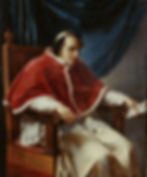Napoleon Reconciled with God: May 5, 1821
- Catholic Textbook Project
- May 1, 2020
- 4 min read
This text comes from our book, Light to the Nations II: The Making of the Modern World.
Pope Pius VII did not forget Napoleon in his exile on the island of St. Helena. “It would be to my heart a joy like nothing else,” the pope wrote to Cardinal Consalvi in 1817, “if I could help in lessening Napoleon’s sufferings. He can no longer be dangerous to anyone. I could only wish that he may not cause anybody remorse.” Pius asked Consalvi to ask Great Britain’s prince-regent, George IV, to ease Napoleon’s sufferings. But the pope’s greatest gift to Napoleon was to send a priest, the Abbé Vignali, to Saint Helena. Pius had learned that Napoleon wanted to be reconciled to the Church.

Napoleon’s life on St. Helena had not been a happy one. The rocky, barren, wind-swept island was grim enough; but Napoleon’s residence, Longwood, was damp, unhealthy, and not shaded by any tree. Water had to be carried to the house, and the nearest water source was three miles away. Napoleon did receive visitors, and he had companions who shared his exile, but the island’s governor would not allow him to speak with the island’s inhabitants. Far worse, the British kept from him all news of his son, now named the Duke of Reichstadt, and of the former empress of France, Maria Louisa.
Yet, though he complained bitterly of the treatment he received, Napoleon did much more during his time on St. Helena. Besides writing complaining letters to British authorities, he dictated his memoirs. It is said the amount of writing he did on St. Helena between 1815 and 1821 could fill four large volumes. Napoleon also took up gardening at Longwood.

The news the pope had received that Napoleon wanted to be reconciled to the Church was true. The dreary life he led on St. Helena gave him time to turn his mind to God. He once commented to a young doctor who laughed at his growing devotion to religion, “Young man! You are perhaps too clever to believe in God; I am not so advanced as that. Not all can be atheists.” The will he wrote on St. Helena opened with strange words for a man who, most of his life, had called himself a Deist: “I die in the bosom of the Apostolic and Roman Church.” In his will, Napoleon said he wanted to be buried according to the rites of the Catholic Church.
In February 1821, Napoleon’s already bad health went into a rapid decline. In March he was confined to his bed, for he could no longer stand the cold. He had set up in the room adjoining his bedroom (from where he could see it) a rude wooden altar and a cardboard tabernacle, over which hung an ebony cross with a silver Corpus Christi. Napoleon knew he was dying and only awaited the final act that would reconcile his soul to God. That came on the evening of April 29, 1821, when the pope’s representative, the Abbé Vignali, entered the sick man’s room. Napoleon confessed and received absolution. Although he did not receive Viaticum (for he could not keep his food down), his turbulent soul was now at peace.
At six in the evening on Saturday, May 5, 1821, while a tropical gale from the sea beat against the house and dimmed the sounds of the prayers for the dead said before the little wooden altar in the next room, Napoleon Bonaparte silently passed from this life. After they had closed his eyes, which had remained open in death, those gathered around the body covered it with the cloak Napoleon had worn at the Battle of Marengo. And at the side of the body that had been Napoleon, they laid his sword. But on the breast, they placed a crucifix.

Many years before, when Pope Pius VII had been his prisoner in Savona, the Emperor Napoleon had said, “The power that rules over souls has a greater sway than that which rules over bodies.” Napoleon had not been able to conquer the pope; but the pope, in a sense, had conquered Napoleon, by the hands of Abbé Vignali. It was the only conquest in which Pius himself could rejoice, for it was a conquest that benefited the conquered.
Nearly two and a half years after Napoleon’s death, Pius himself achieved his own, greater triumph. On July 6, 1823, Pope Pius VII, now 80 years old, fell in his chambers. After being taken to his bed, he lay there for the next month. He did not recover, but only grew weaker day by day. It is said that in his illness, he could not bear to hear the words, “Most Holy Father.” If anyone called him that, he would say, “No, call me ‘poor sinner.’” On August 17, Pius made his final Communion, and two days later received last rites. On August 20, 1823, while absorbed in prayer, he died.
For three nights, Cardinal Consalvi had kept vigil near the pope’s bed. Seeing that Pius had breathed his last, Consalvi knelt by the bedside. There this most faithful servant prayed for his departed sovereign and, weeping, wetted the pontiff’s feet with his tears.
Music from Papa Pio’s Chapel
O Roma Nobilis is a composition of Giuseppe Baini (1775-1844), who served as the director of the choir of the pontifical chapel under Pope Pius VII. The 1911 Encyclopedia Britannica said of Baini’s music, that “his compositions, of which very few have been published, were very favorable specimens of the severe ecclesiastical style, one in particular, a ten-part Miserere, composed for Holy Week in 1821 by order of Pope Pius VII, has taken a permanent place in the services of the Sistine Chapel during Passion Week.”